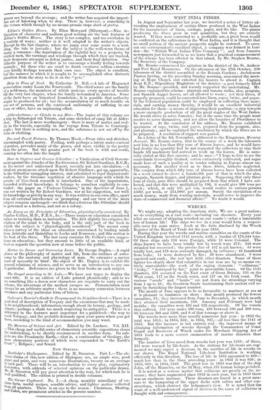WEST INDIA FIBRES.
In August and September last year, we inserted a series of letters ad- vocating the employment of certain fibres produced in the West Indies for the manufacture of linen, cordage, paper, and the like. The plants producing the fibres grow in vast quantities, but they are entirely wasted. If they were converted to a profitable use, a great boon would be conferred on the cultivators in the West Indies, and it is thought that no small portion of the ancient prosperity might be restored. To carry out our correspondent's excellent object, a company was formed in Lon- don—the " British West Indian Fibre Company " ; and from Jamaica newspapers just forwarded to us we learn that a practical commencement of the scheme has been effected in that island, by Mr. Stephen Bourne, the Secretary of the Company. Mr. Bourne commenced his agitation in the district of the St. Andrew and Port Royal Mountains. On the afternoon of the 27th October, 250 labourers of the district assembled at the Botanic Gardens ; Archdeacon Panton having, on the preceding Sunday morning, announced the meet- ing at Hope Chapel, and exhorted his hearers to attend it. Captain Kent R.N., Stipendiary Magistrate of the district—a post formerly filled by Mr. Bourne—presided, and warmly supported the undertaking. Mr. Bourne explained his scheme : plantain and banana stalks, aloe, penguin, and Spanish dagger leaves, are all allowed to waste ; yet their fibres, if properly prepared, could he converted into linen, ropes, twine, and paper. If the Coloured population could be employed in collecting these mate- rials, and earning money thereby, it would be an excellent industrial education for them—a means of improving their position—a step towards a more energetic production of all the great staples of the West Indies. He would strive to serve Jamaica ; but at the same time the people must resolve to serve themselves, and not allow the bounties of Providence to be wasted. At the conclusion of his address, Mr. Bourne exhibited specimens of rope, twine, and paper, prepared from the penguin, aloe, and plantain ; and he explained the machinery by which the fibres are to be prepared. A resolution of support was passed. Ina letter of the 5th November, addressed to the Kingstown Morning Journal, Mr. Bourne states, that in the course of a week the labourers sent him in no less than fifty tons of fibrous leaves, and he would have had double the quantity had he not requested the collectors to stay their hands till machinery had arrived to work up the leaves. He is natu- rally elated at this first success ; and he says—" I hope to live to see the coast-lands thoroughly drained, cotton extensively cultivated, and sugar made here of such a quality as to render refining in Europe almost un- necessary. But another word as to these fibres, hitherto neglected. The country from which fifty tons of fibrous leaves have been collected in a week cannot be above a hundredth part of that in which the aloe, penguin, Spanish dagger, and plantain grow. Supposing that only three tons of clean, pure fibre should be prepared from that which I have col- lected, and that this were multiplied by 100, it would give 300 tons per week ; which, at only 151. per ton, would realize to various persons 45001. per week, or 234,0001. per annum. Surely the circulation of so much money, made from wasting materials, would serve to improve the state of commercial and financial affairs !" No doubt it would.
































 Previous page
Previous page